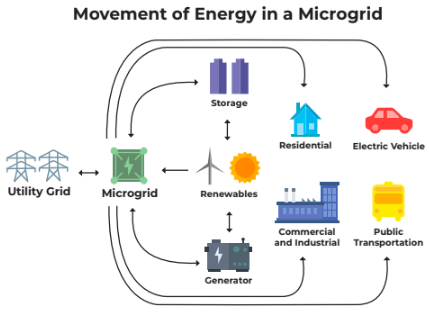Environment & Ecology
In News: TATA Power Renewable Microgrid Ltd (TPRMG), a wholly owned subsidiary of TATA Power, has joined hands with Small Industries Development Bank of India (SIDBI) to provide 1,000 green energy ventures throughout the country.
- 10,000 mini/microgrids in rural areas
- Use of Bio-methane generators powering TATA Power microgrids to meet rural electricity demands in UP and Bihar.
- SIDBI will provide the enterprises with a Go Responsive Enterprise Incentive.
- TATA Power manages one of the biggest microgrid systems in the world and works on the solar off-grid plant with energy storage to supply power in the remote parts of the country.
About:
- Microgrids are energy distribution systems that include a generator and storage system that can be controlled either on-grid or off-grid.
- A microgrid is a very important infrastructure that helps in providing clean, affordable, and reliable electricity in rural/remote areas where the main grid has limited or no reach.

- One of the most important aspects of microgrids is operation and maintenance. Chhattisgarh Renewable Energy Development Agency (CREDA) has a dedicated cell for Operation and Maintenance.
- Every village of the mini-grid has one operator. One cluster technician for every 15-20 villages has been provided by CREDA. The maintenance of the battery is the most important component for energy storage.
- The collection efficiency of the plant should meet the minimum requirements of financial sustainability.
- Capacity-building measures need to be undertaken for the technicians, villagers, and other stakeholders involved in the operation of microgrids.
- TPRMG technology has a one-meter box that can provide supply to around six customers with remote monitoring and controlling features in it with load limiting, time of day and safety features available with it.
Significance of microgrids:
- Non-polluting energy producers can be transformative for rural India, which largely depends on diesel generators to meet its electricity needs.
- They contribute towards reducing emissions in the rural areas and help in the creation of village-level entrepreneurs.
- TPRMG would supply rural areas with reliable, quality, affordable, clean energy, such as solar, wind and biogas.
- SIDBI would help organise finance options for developing businesses in the rural areas through its PRAYAAS scheme.
- This will also help in the development of the associated ecosystem.
- Cost Economy: The cost of energy generation using mini-grids is relatively high in India and TPRMG tackles the issue with innovative technologies such as Group Smart Meter for customers (patented technology of TPRMG).
- Since most customers don’t use the electricity supply for their own consumption; the microgrid is used for farming the neighbouring land too. This helps their income and the benefit reaches other farmers as well.
- TATA Power microgrids have so far proved beneficial to shops, healthcare facilities, flour mills, bulk milk chillers, RO cold water systems, schools, colleges and banks, among many others paving the way for sustainable energy in rural areas.
- TPRMG gave a good opportunity for families involved in reverse migration due to COVID-19 pandemic to pursue rural entrepreneurship through microfinancing measures and paved the way to a sustainable economy for all.
About Bio-methane generators:

- Biogas is produced when organic matter is broken down in an anaerobic environment. Bio-methane generators use the waste from sugar mills to generate electricity.
- Benefits: reduction in energy costs, eco-friendly use of waste, lower installation costs, lower greenhouse gas emissions, lower amounts of waste going to landfills and production of natural fertiliser.
- Economy: Biofuel-based generators are cheaper than diesel generators. However, the they are more expensive compared to the solar microgrid. This is due to the maintenance cost of the plant as well as the sourcing of raw materials for the plant.
- The only disadvantage of solar-based generation is that it can be tapped only during the daytime, which necessitates the requirement of the storage system.
PRAYAAS scheme of SIDBI:
- It is an app-based, end to end digital lending platform.
- Aim: To facilitate loans and low-cost capital to aspiring entrepreneur from the bottom of the pyramid and livelihood entrepreneurs, thereby improving their viability.
- It is being implemented in partnership model in different geographies and segments such as it has onboarded BigBasket to offer loans.
- As on 31 March 2020, it has assisted 14000 micro borrowers with an aggregate sanction of Rs. 161 cr.
- Women and rural beneficiaries constitute 74% and 88% respectively of total beneficiaries
Source: DownToEarth














